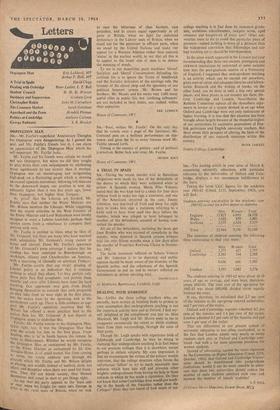Orpington Man Eric Lubbock, MP
Arthur F. Holt, MP
A Trial in Spain David Clegg Dealing with Oxbridge Peter Laslett, L. E. Ball Student Council H. D. D. Watson Snobbery and Suppression Graham Lord Christopher Robin John M. Carruthers The Common on Market Sarah Gainham Apartheid and the Press Hendrik Pienaar Politics at Cambridge Anthony Col man George Padmore J. R. Hooker
ORPINGTON MAN
SIR,—Mr. Fairlie's superficial 'Anniversary Thoughts for Orpington' were disappointing. As I gained the seat, and Mr. Fairlie's friends lost it, I can claim an appreciation of the 'Orpington Man' which the self-important Mr. Fairlie lacks.
Mr. Fairlie and his friends were certain we would not win Orpington, but when we did they sought to play down their own misjudgment by attributing more significance to our victory than it merited. Orpington was an encouraging and invigorating high-peak on a fluctuating graph which is showing an overall upwards movement. Allowing full measure to the downward stages, our position is now sig- nificantly higher than it was five years ago, lower than Orpington, but higher than Torquay.
As 'proof' that the Liberals are finished, Mr. Fairlie says that neither the Prime Minister nor Mr. Wilson mention the Liberals. While suggesting that the recent activities in the West Country of the Prime Minister and Lord Blakenharn were hardly designed to avert a Labour landslide, perhaps their silence stems from a reluctance to compare their policies with ours.
Mr. Fairlie is entitled to think what he likes of Mr. Grimond, but there are many who have watched with admiration Mr. Grimond's rising stature at home and abroad. From .1Mr. Fairlie's ignorance of Mr. Grimond's press coverage I deduce that his reading has been restricted to Peterborough on weekdays, Albany and Crossbencher on Sundays, with a seasoning of Quoodle on alternate Fridays! Mr. Fairlie asserts that our rivals' pirating of Liberal policy is an indication that it contains nothing to which they object. Yet they purloin only those parts they find acceptable, and purloin them months and years after Liberals have done the hard .thinking. Our opponents may gaiti from finally bringing themselves to concede that such proposals as they take from us were right in the first place, but the nation loses by the agonising wait as the Pachyderms catch up. There is little evidence to sup- port Mr. Fairlie's optimistic assertion that Mr. Wilson has offered a more practical lead to the nation than has Mr. Grimond. A lost deposit at Orpington seems to underline this. Finally, Mr. Fairlie returns to the Orpington Man. Quite right, too; it was the Orpington Man that sold the article for him in the first place. From .1`1Pling, who is 'in' in Smith Square this season, he !urs to Shakespeare. Whether he would recognise the Orpington Man as caricatured by Mr, Fairlie, ti;r, the Prime Minister as caricatured by Sir Alec 'Vas-Home, is of small matter. Far from coming to, terms, my - voters suddenly saw through the charade which Mr. Fairlie and Mr. Wilson delight in playing saw muddle instead of method, sloth, not effort, and deception when there was need for frank- ness. They did not blame society, they blamed themselves and voted to start to put things right. or I° say that my party appeals to the 'least side ,,then' when we fought for entry into Europe in
.( in the rural seats of Britain, when we seek
to ease the bitterness of class barriers, race prejudice,, and to create equal opportunity in all parts of Britain, when we fight for industrial democracy in the Labour seats of Britain, when we stand out for the pensioner in affluent parts, when we stand by the United Nations and make our appeal for a Western Alliance rather than national 'status' in the nuclear world, to say that all this is to appeal to the lesser side of men is to debase the meaning of words.
To see in our monolithic party machines 'liberal' Socialists and 'liberal' Conservatives defending the civilised life is to ignore the Tories of Smethwick and the Socialist defenders of the earnings rule, the tyranny of the closed shop and the ignominy of our political honours system. . Mr. Brown and his brothers, Mr. Maude and his mates may fulfil many useful roles in public life, but 'civilising influences' are not included in their duties, nor, indeed, within their capacities.








































 Previous page
Previous page